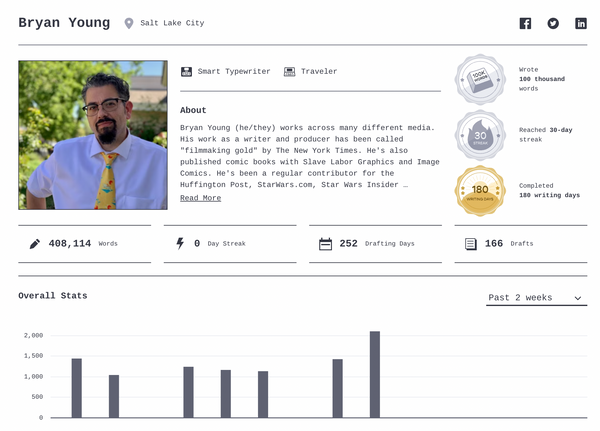“In every job that must be done, there’s an element of fun,” Mary Poppins once wisely counseled Jane and Michael Banks. “You find the fun and SNAP! The job’s a game!”
The same is true for any task you're avoiding. Including writing.
There is a lot of powerful neurochemistry that's unleashed by turning tasks into a game. It's called "gamification," and there's a reason the most successful apps of today use it.
How many times has that sad little Duolingo owl shamed you into continuing your daily learning streak? Who among us hasn't gotten out of bed at 11:59 p.m. to reach their step count goal?
The same methods work for writing, too. It's just a matter of implementing them into your own writing process.

Gamification for Writers
NaNoWriMo (National Novel Writing Month) and its daily word trackers first showed me how powerful it was to record and track data on my writing progress. It kept me extremely motivated throughout the long process of writing a book. And being able to see the task of writing as a friendly competition with my friends worked even better.
But that was only active for the month of November. How could I keep it going all year-round?
Enter Freewrite.
Postbox is the name of Freewrite's web app that backs up your work to the cloud and syncs with other third-party cloud services. The best part about Postbox? It shows you some powerful writing stats!
By setting up a Postbox profile, you get access to a unique URL that serves as a home for your Freewrite stats and achievements. Things like word count are tracked automatically, and you earn badges for hitting certain milestones.
With my public Postbox profile, you can always keep me accountable. I’m currently working hard to get my 500,000 words badge. I’m well over 400,000 now, so I should hit it this year, easy.
Gamifying last year's NaNoWriMo with other Freewrite users is what pushed me to win the Freewrite leaderboard — I was the writer with the top word count among Freewrite users in November!
Picking Your Stats
Different stats will inspire different writers. Here are a few that work for me:
1. Word Count
Your Postbox Profile keeps track of your daily word count written on Freewrite and displays it in a handy graph. I've taken this method even farther in order to keep track of all of my writing across all platforms — from my Freewrite to my Smith-Corona 2200, my computer, and even pen and paper.
My writing group and I made our own spreadsheets to keep track of our daily, monthly, and yearly word counts against each other, but also keep track of our daily writing streaks.
2. Streak
This is the same principle the Duolingo owl uses to inspire (and terrify) users.
I’m the sort of writer who feels like working on my writing every day is a great way to keep up my momentum and to that end, keeping track of my streak gamifies it in a way that keeps me on task.
Watching my streak has been so effective for me that as I write this, I am on day 3,261 in a row of writing. That means I started in July 2015 or so and haven’t stopped.
Being able to watch that number tick up every day has kept me writing through vacations, surgeries, illnesses, hospital visits, holidays — you name it.
Find Your Motivation
In that nine years of daily writing, I’ve written millions of words, dozens of books, thousands of articles, and more. Gamification works for me. For others, it doesn’t work like that, and there’s no shame in that.
What you need to do is find what works for you.
Like Mary Poppins said: Find that element of fun and SNAP! Your writing will be a game. Easy.























